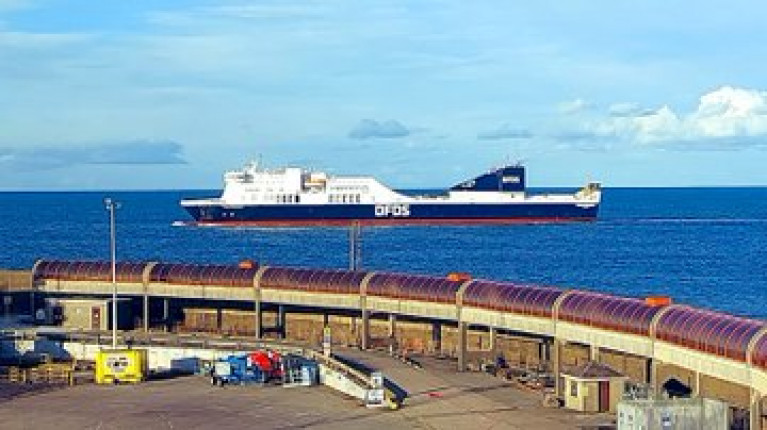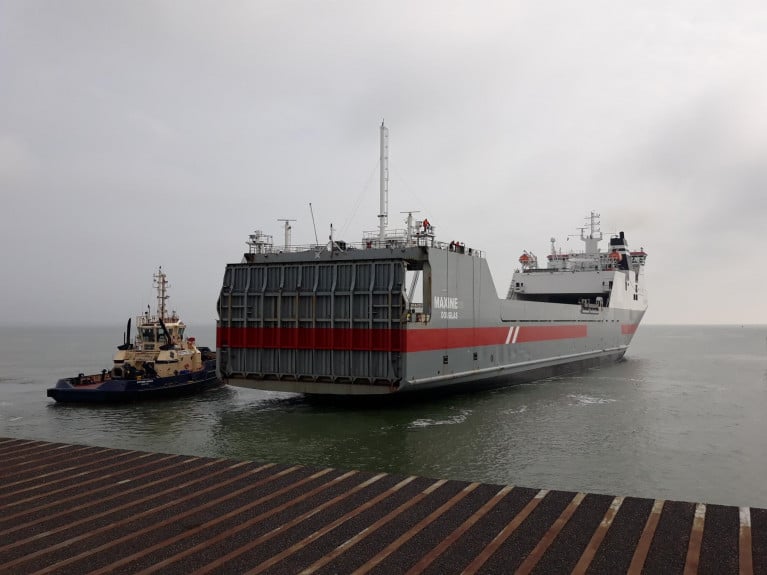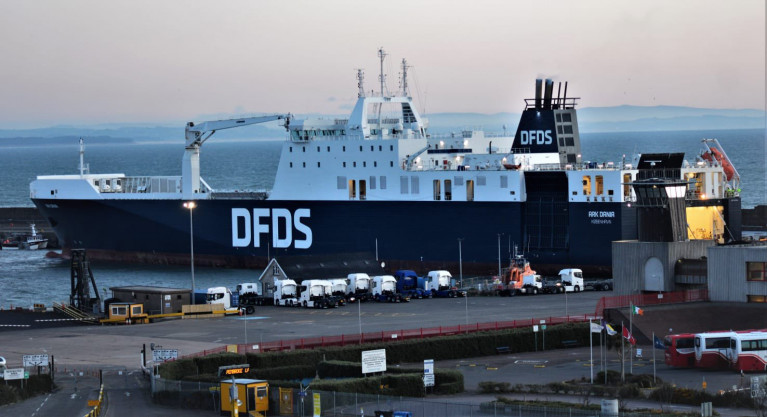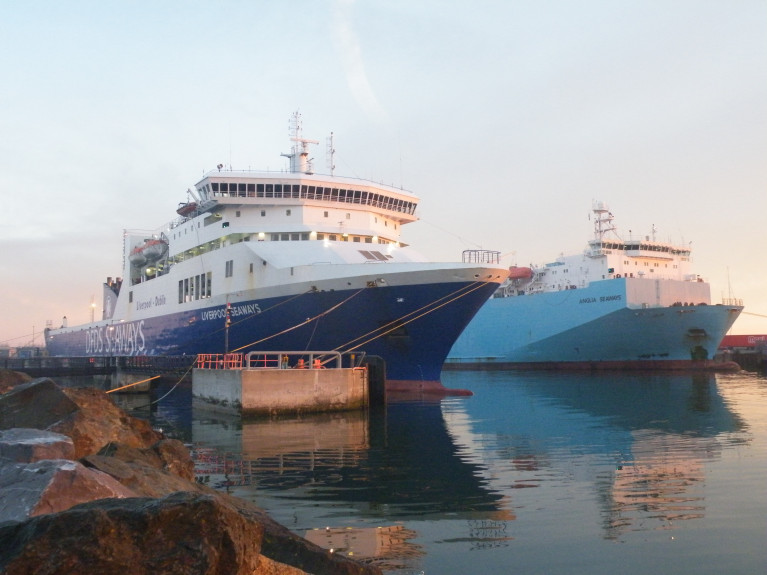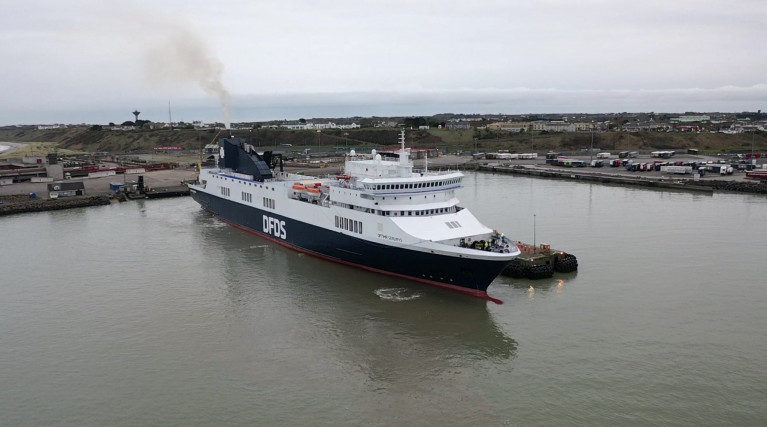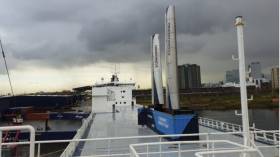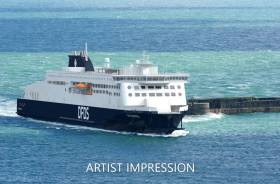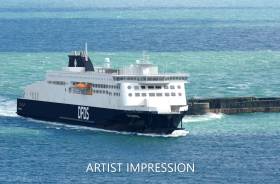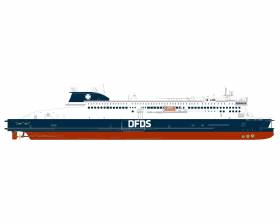Displaying items by tag: DFDS
Regina's Rosslare Europort Debut Boosts Brexit-Buster Capacity by 30% on Ireland-EU Route
Regina Seaways is the latest freight-only ferry to serve DFDS Rosslare Europort-Dunkirk 'Brexit-buster' route, having this month begun service on the direct link to the continental mainland, writes Jehan Ashmore.
The debut of Regina Seaways further increases capacity to 30% on the Ireland-France route which is operated by the Danish shipping and logistics company.
In addition with the introduction of Regina Seaways, having replaced Kerry, brings a new timetable where the ropax along with the chartered-in Visby, which also has a higher speed, will reduce passage times.
The changed DFDS timetable means that instead of three vessels running simultaneously, this is now reduced to these two freight-ferries.
Since the Ireland-EU route started more than 9 months ago, the route has employed several vessels to bypass post-Brexit Britain, thus enabling lorry drivers to avoid customs paperwork, restrictions and potential delays. Freight on the route also includes provision for un-accompanied trailers.
The DFDS owned Optima Seaways which launched the inaugural sailing on 2nd January, also saw another fleetmate, Ark Dania employed on the route, though both vessels have move on. The former Afloat tracked with a return to the Baltic Sea while the latter vessel is in Greek waters.
Regina Seaways marks the seventh ship so far to serve the route, whereas with exception of the DFDS pair, the rest of the vessels were all chartered-in.
The charters involved Drotten (sister of Visby) which came from Swedish operator, Destination Gotland, Kerry from Stena RoRo and Pelagos from French operator Méridionale.
In the UK, the Peel Ports Group through its London Medway area of operations has welcomed DFDS new England-France freight-only ferry route connecting Sheerness and Calais that is to begin service this month.
The new freight route offers one daily sailing in each direction between the two ports using the ro-ro Maxine, which can carry up to 165 unaccompanied freight units - which are trailers or containers without drivers.
This latest development expands DFDS’ existing network of services between the UK and Europe and comes in response to growing demand for unaccompanied freight services from cargo owners, hauliers and shipping lines alike.
Most of the unaccompanied freight carried today by DFDS on the two Dover Strait routes – Dover-Calais and Dover-Dunkirk – is expected to be transferred to the new route.
(Noting Afloat adds in January, DFDS launched a direct Ireland-France service connecting Rosslare Europort and Dunkirk, to provide freight hauliers an alternative to a post-Brexit UK landbridge to mainland Europe).
As for the Port of Sheerness located in north Kent, the port offers excellent into and around the UK. It operates 24 hours a day and is fully open and accessible seven days a week, offering congestion free access to drop and collect trailers.
Owner Peel Ports has invested heavily into enhancing its facilities and services, making it the perfect port to accommodate this new service.
The combination of challenges posed by Brexit and Covid-19, has exposed drivers and haulage companies to vulnerabilities in supply chains worldwide.
This has resulted in many cargo owners and carriers re-assessing their transport plans and choosing different ports, different shipping methods and switching transport modes to future proof supply chains.
The partnership between DFDS and Peel Ports will create up to 100 new jobs in the region, with recruitment already underway for many of these roles.
Maxine's sailing roster will involve a daily arrival into Sheerness at 05.00 and from where it will be unloaded and reloaded to make its return journey back to Calais at 11.00.
DFDS Reports Freight Up 31% Following Lockdowns in 2020
Ferry operator of the Rosslare-Dunkirk link, DFDS has reported monthly volumes for freight and passengers so to provide additional insight into the development of trends in the Danish company’s European route network.
Freight-ferry: Total volumes in May 2021 were 31.2% above 2020. Net adjustments for structural route changes reduced growth 3.2 ppt to 28.0%.
The extraordinary volume growth in May 2021 vs 2020 reflected a recovery from the significant volume reductions in May 2020 caused by Covid-19 related lockdowns. Volumes in May 2021 were 7.4% above May 2019 adjusted for structural route changes.
Volumes were above May 2019 in each of the four business units mainly carrying freight, i.e. North Sea, Baltic Sea, Channel and Mediterranean. Trading between the EU and the UK continued to be robust.
Passenger Ferry: The total number of passengers in May 2021 was 27.3% below 2020 reflecting the continued tight travel restrictions.
The June volume report is expected to be published on 12 July 2021.
Following Irish Ferries two-month charter in February of a Meditteranean ferry, DFDS, operator of the new Rosslare Europort-Dunkirk freight route is to introduce a ferry from Marseille next week, writes Jehan Ashmore.
Pelagos, will become the fifth ferry so far involved since DFDS launched the direct Ireland-mainland Europe service in early January. This to bypass Brexit, benefitting freight hauliers by avoiding the British land-bridge and potential delays associated in UK-EU customs paperwork.
The debut of Pelagos is to replace a ferry, the Drotten that only entered service in late January.
Afloat confirmed with DFDS as to when the Pelagos starts serving hauliers on the direct Ireland-France route. The link that transits the entire English Channel and into the Celtic Sea takes almost 24 hours to connect continental Europe.
The operator stated that Pelagos will take over from Drotten, which is scheduled to make a final outbound sailing from Rosslare on Monday night. On the next day, Pelagos will then be slotting into service also from Rosslare by taking up a sailing bound for Dunkirk.
As of other ropax's that have come and gone on the route, Pelagos is a product of the popular Visentini shipyard built class ropax, which had been in the Mediterranean. A repositioning voyage took five days as the ferry arrived to the northern France port on Thursday.
The 114-freight trailer unit ferry has been chartered back to its previous owner DFDS which as their Liverpool Seaways served DFDS Dublin-Birkenhead (Liverpool) route more than a decade ago.
As Afloat reported then the Liffey-Mersey link (incl. 'foot' passengers) was DFDS final presence on the Irish Sea when it closed in January, 2011. The Danish operator having in July 2010, for the first time entered the Irish Sea market. Albeit, merely 'months' later their other Irish Sea routes and vessels were sold to Stena Line.
Returning to Rosslare where Drotten, it is understood whose operator Destination Gotland AB, require the vessel back in the Baltic Sea to serve between the Swedish island and the mainland.
Drotten, had only entered service in late January, having replaced DFDS Optima Seaways, which launched the new route by making a maiden sailing, two days post-Brexit on 2nd January.
Earlier this month, DFDS announced it was to introduce their Ark Dania, as the route's fourth vessel next month. A maiden call in Dunkirk is scheduled on 1st April.
With this fast-changing ferry scene, Afloat take a recap on the current three-strong fleet, prior to the pending departure of Drotten to Scandinavia.
The ferries involved are Visby, same class of the Drotten, and also chartered from the Swedish operator. In addition the Visentini ropax Kerry on charter from Stena RoRo.
Clean Shipping Alliance (CSA2020) Appoints New Executive Director
The Clean Shipping Alliance 2020 (CSA2020) has confirmed the appointment of ferry operator DFDS executive Poul Woodall as its Executive Director which took place at the start of this year.
CSA 2020 (website) represents ship owners and other key maritime industry stakeholders as an advocate and science research body for the environmental benefits of marine Exhaust Gas Cleaning Systems (EGCS) along with other marine environmental issues.
“We are delighted and honoured that Poul has agreed to lead our Secretariat as Executive Director said Mike Kaczmarek , CSA 2020 Chairman , Poul is a highly respected figure in the international maritime industry, and his substantial industry experience along with his knowledge of CSA2020 and today’s key issues will make him a valuable asset to the ongoing work of the Alliance.”
Poul has over 40 years of maritime industry leadership in international operational roles in Ro-Ro, container and passenger segments with Maersk and DFDS (see: photo related EU Sulphur Directive). His most recent position was as Director of Environment and Sustainability with DFDS Group in Copenhagen and he will remain with DFDS Group in a part-time role as Senior Advisor, Climate & Environment. Poul is widely recognised as an influential speaker and guest panellist and has actively participated in many international maritime forums in recent years.
Poul said: “I am looking forward to a more “hands on” role to help advance the important work of the Alliance. Already we have started to rebuild the Secretariat staff with experienced professionals in key areas such as regulatory affairs, port relations, and communications, in addition to our ongoing commitment to environmental sciences. This is a key time frame for the international maritime industry and its important that CSA2020’s voice is heard at the forefront of important environmental and sustainability commitments and decisions which need to be made.”
Poul is also a founding Director of CSA2020 and will retain his seat on the Executive Committee.
First DFDS Freight Ferry for New Rosslare Europort-Dunkirk (France) Route Makes Berthing Trials
Rosslare Europort welcomed the first of three ro-ro freight-ferries, that DFDS will operate on the eagerly awaited new direct route to Dunkirk (Dunkerque) in northern France thus avoiding the UK's Brexit Land-bridge, writes Jehan Ashmore.
Afloat tracked the Italian 'Visentini' shipyard built Optima Seaways owned by DFDS which departed the French port on Monday evening before berthing in Rosslare Europort this morning.
The inaugural freight sailing is scheduled to take place this Saturday, 2nd January with the departure from the south-east Irish port to mainland continental Europe.
The new route will enable Irish hauliers and other freight customers to keep their vital trade transported within the EU and avoid the customs formalities imposed by Brexit and associated potential delays.
DFDS will run 6 weekly departures from each port, either in the afternoon or evening, with a crossing time of just under 24 hours. To maintain such an intensive schedule the Danish operator has chartered in an additional pair of ships and crews, they are the Kerry, another Visentini built ropax (same design of Optima Seaways) and the larger passenger capacity ferry, Visby which will serve in a freight-only mode.
The DFDS vessel along with the chartered ferries have each a capacity for up to 120 trucks and trailers plus drivers. Accommodation for drivers will be based on individual COVID-19 safe cabins during the crossing of just under a day long in duration.
Another bonus for the Wexford port will be the launch of another 'Brexit-buster' service when Brittany Ferries further consolidates its presence in the opening of a combined freight and passenger 'no-frills' ferry service to Cherbourg on 22nd March. On the next day their Cork-Roscoff 'seasonal' route resumes to Brittany.
As for Brittany Ferries new Ireland-France service to Normandy using the Visentini ropax Connemara, this will be in competition with Stena Line's service also serving the port at the tip of the Contentin Peninsula. They operate the similiar Stena Horizon, once again another ropax series from the prolific Visentini shipyard. In addition due to a surge in demand, freighter Stena Foreteller began an earlier than scheduled service prior to a planned 4th January start.
Returning to the DFDS new Ireland-France route, is the deployment of mixed vessel types involving a pair of more freight orientated vessels (ropax) limited to around 300 passengers and 160 cars approx. This compared to the larger 1,500 passenger/500 car ferry capacity Visby which as mentioned beforehand (likewise of the ropax's) will be carrying only trucks and drivers.
Perhaps, the chartering of the Visby from Swedish based operator Destination Gotland is just a short term measure? This vessel however had previously served a short sea crossing to the Baltic Sea island of Gotland which took only 3 hours and 15 minutes. Or will DFDS consider opening a 'full' ferry service with a suitable overnight ferry for holidaymakers during the high-season? This would facilitate the Ireland-BeNeLux nations link and Germany in addition towards central Europe.
Noting Brittany Ferries earlier this year opened the new Rosslare-Bilbao route to northern Spain. The route compared to the DFDS operation has a longer crossing time of 28 hours plus when traveling across the Bay of Biscay.
Rosslare Harbour has had a history of pioneering new direct ro-ro routes to mainland Europe, beginning firstly in 1968 by the Irish Shipping Ltd (ISL) route to Le Havre launched by a pair of Normandy Ferries, one each from two other shipping companies in a troika venture until they pulled out four years later. After an absence of the 1972 season, two Scandinavian companies joined ISL to form the following year the ferry division of Irish Continental Line (ICL).
ICL was a passenger subsidiary of the state-owned Irish Shipping Ltd, however the cargoship side went into liquidation in 1984, however ICL survived and would later evolve to become Irish Ferries, whose parent company is the Irish Continental Group (ICG). The ferry firm currently operates from Rosslare but only to the Welsh port of Pembroke in the UK while Stena serve Fishguard also in Pembrokeshire.
As for Irish Ferries services to France, in recent years the operator abandoned the Wexford port and relocated to Dublin Port from where Cherbourg is still served but no longer does the operator run the Rosslare route to Roscoff.
The route between the Irish capital and Cherbourg is operated by yet another variant of a Visentini ropax in the form of the chartered Epsilon. In addition the cruiseferry W.B. Yeats takes over the role of the ropax in May and for the summer season.
Shipping Operator DFDS Tests Aluminium Sail Concept
An interesting take on wind-power made by Econowind has now been installed on DFDS container/side-port loader vessel Lysbris Seaways following recent tests in the Netherlands.
A metal sail in a box is a novel concept, but it could be a solution to save fuel and emissions for shipping by utilising the power of the wind that nearly all ships once relied on.
The prototype (view video) was installed on the deck of Lysbris Seaways last month in Amsterdam. The system is from Dutch company Econowind which created a foldable aluminium sail concept that sits on the deck of a vessel. It comes in a 40-foot container and is a far cry from historic sail designs, as two metallic 10-metre foils, or wings, fold out with the press of a button.
The design and software let the wings move to optimally catch the wind and help propel the vessel forward. Just last week the company received the Dutch Maritime Innovation award for the Econowind unit, which shows promise from earlier testing.
Poul Woodall, Director of Environment, and Vidar Karlsen, Managing Director in Norway, signed the agreement in September for the collaboration with Econowind and Green Shipping Programme (Grønt Skipsfartsprogram or GSP), a Norwegian programme for research into, and development of, green shipping solutions. GSP delivers a theoretical modelling of historic weather data, consumption, routes and more that we use for testing.
Vidar says: “Lysbris Seaways is perfect for testing such a concept. In theory it looks like a good idea, but we need to see if the estimated fuel savings are realistic for this type of vessel. We are going to measure fuel consumption with the sail and get a picture of the efficiency gained over time compared to the regular numbers.”
“The finalised design works automatically, meaning you can open the container from the bridge and open the sail, but for the prototype it’s a bit more hands-on with manual controls and a service engineer present to operate the system. After a successful installation we are now looking forward to seeing the outcome of the two months of testing,” Vidar adds.
Sofie Hebeltoft, Head of CSR, says: “With projects like this we take responsibility for developing new energy sources and methods of propulsion that can take us towards cleaner ships and eventually zero emission shipping. We are therefore extremely grateful for initiatives such as this taken on by Vidar and his team.”
Operator DFDS Announce Official Keel-Laying for Dover-Calais Newbuild, Cote D’Opale
Danish operator DFDS recently announced another milestone at the Avic Shipyard in Weihai, China, as the keel was officially laid on the new charter vessel, Cote D'Opale, the name which was previously reported on Afloat.ie
Owner of the newbuild Stena-E-Flexer class, Stena RoRo and DFDS will take the ferry on a 10 year bare-boat charter from delivery in China in June 2021.
Cote D'Opale will enter service on the Dover-Calais route, the busiest ferry-route between the UK and mainland Europe.
The new ferry will be the longest ship on the channel with capacity for 1,000 passengers and crew.
DFDS also operates passenger ferry services, Dover to Dunkirk, Newcastle to Amsterdam and Newhaven to Dieppe (see related story).
In addition to the UK routes, DFDS which is northern Europe’s largest integrated shipping and logistics company, they operate ferry routes in Scandinavia, the Baltic and an extensive freight-ferry network.
Danish Giant DFDS Announce Name of New English Channel Ferry for Dover Service in 2021
Danish shipping giant DFDS, has announced the name of their new ferry Côte D'Opale which is due for English Channel service between Dover and Calais in 2021.
The newbuild is named after a region of France that overlooks the English Channel. The Côte d'Opale is a French coastal region bordering Belgium, situated opposite the cliffs of the south-east of England.
Côte D'Opale yesterday started its journey with the first steel plates being cut in the traditional steel cutting ceremony. The vessel is being built at the AVIC shipyard in Weihai, China and will be launched for operation in 2021 on the Dover Calais route. It will be the longest ship on the channel with capacity for 1,000 passengers and crew.
The emphasis has been to provide customers with the best possible service and experience on board each and every day. Earlier this year DFDS put extensive investment into ensuring their ships are the best in meeting customer's needs, with investing in a substantial fleet renewal programme to ensure continued growth. Improving the customer experience with passenger comfort, children's play area, familiarity and dynamic food concepts at the forefront in the design process. Also offering WiFi, children's play area and easily accessible outdoor space.
Further development of the modern sea travel experience will be replicated over time across the fleet on the English Channel, which will bear a familiar resemblance to the Côte d'Opale. Further enhancing the best possible customer experience that DFDS has to offer, regardless of which vessel customers sail on.
Kasper Moos, Head of Short Routes and Passenger in DFDS said "We have great pleasure in announcing our new ship will be named the Cote D'Opale and the steel cutting marked a very special and exciting time as the ship starts to take shape in the construction process. The Côte D'Opale will give our passengers a relaxed travel experience with modern food concepts and the largest shopping experience on the channel. We continue to have a clear focus on our customers and take great pride in continually seeking improvements to ensure those special memorable experiences of travelling with DFDS.''
DFDS Charters New Ferry for Dover-Calais Service In 2021
#FerryNews - A new ferry for DFDS's Dover-Calais route will be able to carry 3,100 lane metres of cargo and 1,000 passengers. It will be built in China and deployed on the Channel in 2021.
According to DFDS, the Channel is a big and important market. Every year, five million passengers, one million cars and 1.2 million trucks travel between Dover – Calais and Dover – Dunkerque on DFDS’ ferries.
To continuously meet the customers’ demands, DFDS has decided to deploy a new ship specially designed for the services in the Channel from 2021. The ship will be built in Avic Weihai shipyard in China.
“Since the ship has not yet been built, we have great opportunities to make sure that it is designed to give our guests the best possible experience with a completely new ship. We will charter the ship from Stena RoRo and operate it for 10 years with an op-tion to buy it after that. And since we are considering replacing the fleet on the Channel in 2031, the timing is really good,” says Peder Gellert, EVP of the Shipping Division in DFDS
Four DFDS captains have been testing in simulators how to navigate the future ship to make sure that the new ship is best fitted out for the conditions on the Channel. “When sailing on the Channel, we need to ensure that the ship is at least as fast in arrival and departure situations as our current ships. Therefore, we have made modifications to increase maneuverability,” says Henrik Tidblad, Commercial Fleet Director.
The ferry will be highly efficient and environmentally friendly with an expected reduc-tion in oil consumption of around 25% compared to current ferries. It will be able to carry 3,100 lane metres of cargo and 1,000 passengers. With this capacity, it will be the largest of the ships on the Channel.
“I am really looking forward to getting this fantastic ship to boost the business on the Channel. This new ship gives us excellent opportunities to develop our business on the commercial side. A newbuild ship will give us the flexibility to make room for tax-free shopping, depending on the outcome of Brexit. Together with an architect, we will design the interior of the ship to make sure we maximise our opportunities,” says Kasper Moos, VP of Business Unit Channel in DFDS.
The initial plan is for replacement of the oldest of the ferries, Calais Seaways, which was built in 1991. Market developments will determine the final deployment plan, which will be announced in 2020.



























